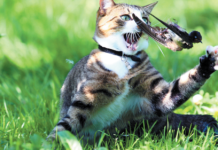Your cat, normally so fastidious, has started lounging in her litter box. What’s going on? One possibility is that she has developed a condition that makes her feel the urge to relieve herself very frequently, so she’s trying to stay close to the “toilet,” so to speak. Illnesses that can increase the urge to urinate include a urinary tract infection, urinary crystals or stones, kidney disease, and diabetes. It’s important to rule out any of these diseases. Certainly if your cat is trying to urinate but not getting much out or seems to be in pain while “going,” she should be seen by the vet. Appropriate treatment should help solve the problem.
If everything checks out medically, there’s a good chance something has changed in your cat’s environment that is causing this change in her behavior. Or maybe something about her living situation has reached a tipping point, and napping in her litter box is how she has decided to cope. Here are some possibilities, and some ways to address them.
Environmental changes. Cats like things to stay the same, so bringing home another pet — or a new baby, houseguest, or significant other — can throw her and lead her to take comfort in her litter box, which is hers and hers alone and therefore is comforting. Even rearranged furniture or loud noises from nearby construction can prompt her to take comfort in what’s familiar and unchanged. Then, too, the litter box smells like her, thereby increasing her sense of security.
Solution: Create one or more cozy spaces that are just for her — and that have items with her scent on them, such as a blanket and some of her toys. The space should take the form of a tight and comfy box that she can squeeze into or a cat bed that looks like a half shell because it has a curved top. That option might be particularly enticing if her litter box has a top on it. It’s okay to leave the new hideaway right next to the litter box. That way, the odors your cat is seeking will still reach her.
Territoriality. If you have more than one cat, you may not have enough litter boxes for one of them to comfortably “own” her space.
Solution: Make sure to have one more litter box than the number of cats in your home. Your cat’s need to protect her space by literally staking claim physically will diminish.
Arthritis or other mobility issues. These are also medical problems, of course, but not urinary ones. Your cat may find it difficult to step in and out of the box — perhaps it has become painful — so she has decided she would just as soon snooze there rather than go back and forth. There are medicines and sometimes surgeries to reduce joint and muscle pain, but sometimes what’s needed is simply easier access.
Solution: See if you can find a litter box with a lower lip so it’s easier to step over. Additionally, put more litter boxes around the house, going beyond the number-of-cats-plus-one rule. The less ground your pet has to cover to walk to the “bathroom,” the more inclined she may be to leave the box once she has finished relieving herself.
Cognitive Decline. Like a person with cognitive decline, a cat who has it can become confused — and mistake her litter box for one of her resting spots. Objects may not have the same meaning anymore.
 Solution: There’s no cure for cognitive decline, technically known as feline cognitive dysfunction, but its progress can be slowed. Make a conscious effort to keep engaging with your cat in fun activities. Also, see what the vet thinks about a prescription for selegiline hydrochloride. It has been approved only for dogs, but some say that off-label use in cats has slowed cognitive decline in that species as well. You can also talk to the vet about a “brain-boosting” diet, which will contain more antioxidants and fish oil than other cat foods. Evidence for its usefulness is scant at best, but it’s a can’t-hurt-might-help option.
Solution: There’s no cure for cognitive decline, technically known as feline cognitive dysfunction, but its progress can be slowed. Make a conscious effort to keep engaging with your cat in fun activities. Also, see what the vet thinks about a prescription for selegiline hydrochloride. It has been approved only for dogs, but some say that off-label use in cats has slowed cognitive decline in that species as well. You can also talk to the vet about a “brain-boosting” diet, which will contain more antioxidants and fish oil than other cat foods. Evidence for its usefulness is scant at best, but it’s a can’t-hurt-might-help option.




